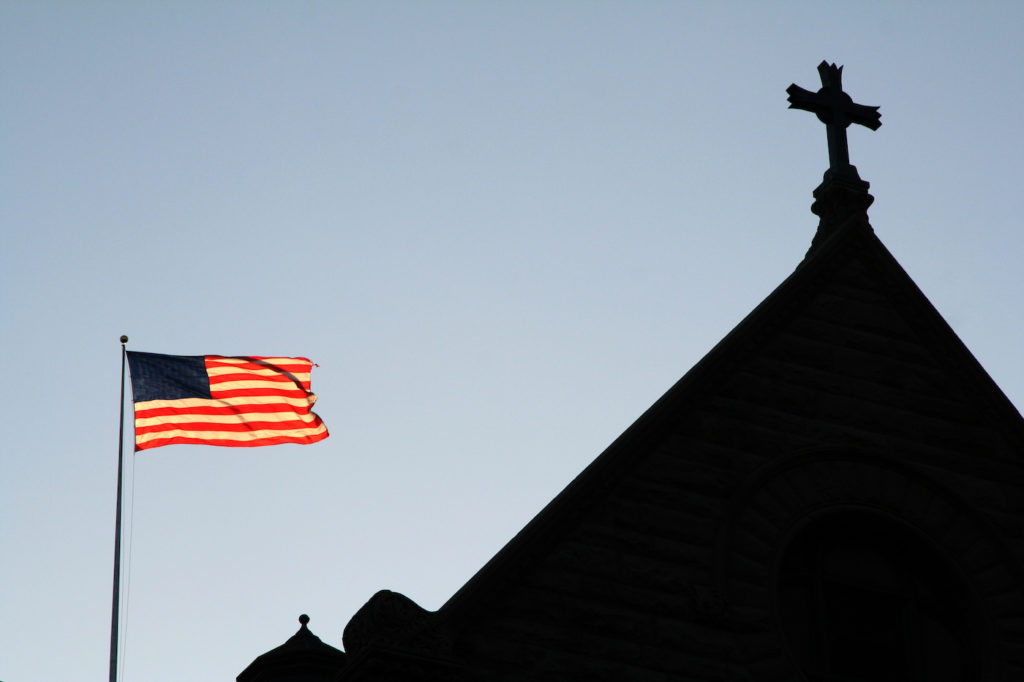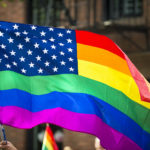While much attention has been paid to the political polarization in America, far less has been given to the new schism growing in Christianity. According to George Yancey and Ashlee Quosigk, sociologists and authors of One Faith No Longer, American Christianity has begun to mirror our red and blue politics with conservative Christians trusting Jesus and progressive Christians sworn to social justice. While both camps claim to be Christian, conservative and progressive Christians have different conceptions of what that means. With our politics and faith so intertwined today, the authors wonder whether another schism is on the horizon.
Although this book represents a significant contribution to social scientists’ understanding of Christianity by shedding light on progressive Christians (a subject that has been woefully neglected), the idea that Christians can’t agree among themselves is not as striking as the authors seem to want us to think. After all, Christians have always disagreed among themselves, not only about what constitutes the essence of their faith, but also about political questions. And this is even more compounded in a country like America where the freedom to practice one’s religion is guaranteed by the Constitution—where Christians of every stripe, and non-Christians too, can worship as they please.
Theological Concerns, Political Views
But what does it mean to be a Christian in America today? For the authors, religion is a crucial component of one’s social identity: who you are, what your purpose is, and what you believe to be moral. Because the answers to these questions from one religion are often mutually exclusive to answers offered by another group, religious identity can facilitate intergroup religious conflict. Just think of how Protestants treated Catholics in the nineteenth century or how Muslims and Mormons are treated today.
Start your day with Public Discourse
Sign up and get our daily essays sent straight to your inbox.But sometimes religious groups perceive other religious groups as quite similar to themselves and form an alliance. Such alliances can work together to achieve social, political, and religious goals. For example, since the 1970s Catholics and Protestant Evangelicals have worked together in the pro-life movement. Those religious groups to which we belong or other groups we perceive to be similar to us are called “in-groups,” while those groups whose members with whom we disagree or see as dysfunctional are labeled “out-groups.”
According to the authors, both in-groups and out-groups play a significant role in establishing our social identity by setting boundaries concerning our beliefs and behavior. Conservative and progressive Christians have different social and ideological pressures in how they select which groups they support and which ones they oppose. While there is no significant difference by age, progressive Christians are more likely to be male, white, highly educated, and wealthy. But they are less likely to attend religious service regularly in comparison to conservative Christians. They are also more progressive than their conservative counterparts on political issues like same-sex marriage and abortion.
Using data from the 2012 American National Election Studies, the authors compare the attitudes of conservative and progressive Christians toward Christian fundamentalists, atheists, Muslims, political conservatives, and political progressives. As expected, conservative Christians are more likely to accept fundamentalist Christians and political conservatives, while rejecting atheists, Muslims, and political progressives. Progressive Christians, however, accept atheists and Muslims at a similar level as the rest of the nation and reject fundamentalist Christians, conservative Christians, and political conservatives.
Conservative Christians emphasize theological compatibility while progressive Christians look at conformity to the progressive political viewpoint.
What explains these differences is the extent to which theology drives politics or politics drives theology. Conservative Christians are more strongly tied to their theological concerns than their political ones, which determines their social in-groups and out-groups, whereas progressive Christians’ decisions are anchored in their political concerns. In other words, conservative Christians emphasize theological compatibility while progressive Christians look at conformity to the progressive political viewpoint. This is not to say that conservative Christians don’t care about politics; rather, God comes first.
Frenemies or Enemies?
The strong ties between religious identities and political beliefs are more apparent in the chapters that employ qualitative analyses of the relationships between, on the one hand, conservative Christians and political conservativism, and, on the other, progressive Christians and political progressivism. What the authors discover is that political values are the key to defining the boundaries of in- and out-groups for progressive Christians, but for conservative Christians’ politics, religious values are central.
One of the more interesting findings is that even when a progressive Christian is pro-life, the person is critical of the pro-life movement. In the words of one:
And here’s where the pro-life movement I grew up with went wrong—they often hold their belief in a highly obnoxious, rigid, and unsympathetic way. Don’t do that! Instead of shouting people down with signs and comments you got off a bumper sticker somewhere, articulate your pro-life views with humility and dignity.
Even if they agree with conservative Christians on abortion, pro-life progressive Christians want to make certain that they separate themselves from this movement. Instead of focusing only on abortion, pro-life progressive Christians speak about a “consistent life ethic” that addresses other issues like poverty, racism, and global warming. In this way, pro-life progressive Christians imply that their pro-life stance stems not from God or the Bible but from their progressive political values.
The extent to which religious or political values form perceptions of in- and out-groups produces predictable outcomes, such as the way in which conservative Christians view Muslims as an out-group, while progressive Christians don’t. But one of the more fascinating results is that conservative Christians perceive progressive Christians as part of their in-groups while progressive Christians don’t. In fact, many progressive Christians believe Muslims are morally superior to conservative Christians. Because of their political values, progressive Christians have adopted “a flexible, Jesus-centric theology” that emphasizes social justice. By contrast, conservative Christians’ political views are informed by biblical doctrines of original sin, God’s righteousness, and salvation through belief in Christ.
When conservative Christians perceive progressive Christians as part of their in-group because both profess a belief in Christ, they delude themselves in thinking that progressive Christians could be potential allies in political struggles.
From these studies, it seems that progressive Christians have a more accurate understanding of the political landscape than do their conservative brethren. When conservative Christians perceive progressive Christians as part of their in-group because both profess a belief in Christ, they delude themselves in thinking that progressive Christians could be potential allies in political struggles. Progressive Christians prioritize their political values over their theological ones, putting them at odds with conservative Christians, whom they paint in negative stereotypes. Progressive Christians are also more likely to work politically with Muslims and atheists instead of with conservative and fundamentalist Christians. Apparently conservative Christians still haven’t figured this out yet.
A Great Divorce?
For the authors, the evidence suggests an emerging split within Christianity, such that the “pervasive assumption that progressive and conservative Christians can be lumped together” should be rejected. The notion that Christians wield commanding social, cultural, and political power because they are the largest religious group in America must be adjudicated in light of the difference between conservative and progressive Christians. In America there is not one Christianity but two: red and blue.
For red Christians, meaning is found in obedience to God as described in the Bible. For blue Christians, meaning is found in the alteration of society on the principles of social justice, which happen to include God. While both red and blue Christians use the same symbols in their worship, each group attributes different meaning to them. With such contrasting goals, the authors think, agreement between red and blue Christians is impossible. At best we can hope for amicable divorces like the United Methodist Church in 2020; at worst, we are looking at another schism or progressive Christians rebranding themselves as some other religious group.
Enduring Truth
Overall, though, the book simply confirms an enduring truth about the history of Christianity in America, and the history of Christianity itself—that disagreement about what it means to be a Christian has always existed since the very beginning of the faith. Indeed, Christians were initially split over the inclusion of gentiles into their fold. They then debated which books should be included in the Bible, when the end times were to occur, and the nature of Christology itself. And that was only the first four hundred years.
The subsequent controversies among Christians—Nestorianism, the East-West Schism, the Investiture Controversy, the Avignon Papacy, the Protestant Reformation—fragmented Christendom into different theologies, church structures, and canonical books. In the United States, Christianity was introduced during European colonization. Catholicism was established in the colonies of New Spain and New France; Protestantism in the British colonies; Russian Orthodoxy in Alaska and parts of the west coast.
After the American Revolution, there were arguments about Christianity’s role in society—the relationship between church and state, the political place of Catholics, and whether natural selection should be taught in public schools. Christians played prominent roles in politics for both conservative and progressive causes: the Social Gospel and Civil Rights Movements for the left and the Moral Majority and the pro-life movement on the right.
While the authors provide many illuminating sociological insights into Christianity in America today, I am not as taken aback as they think I should be that Christians can’t agree among themselves. Christians have always disagreed among themselves, particularly when it comes to politics. After all, any time religion and politics are mixed, polemics are bound to happen. It has always been that way and always will be—and this is one factor that makes Christianity so sociologically compelling.














